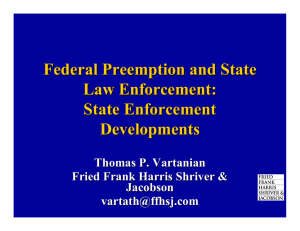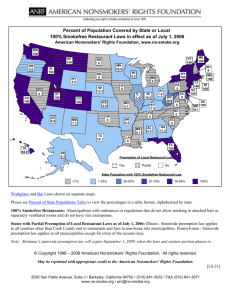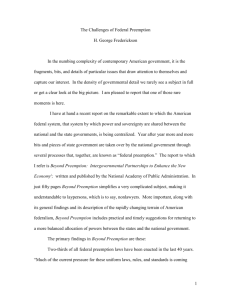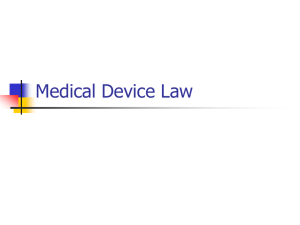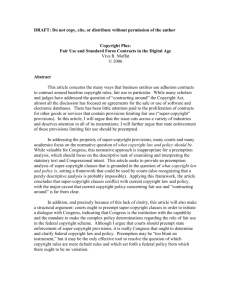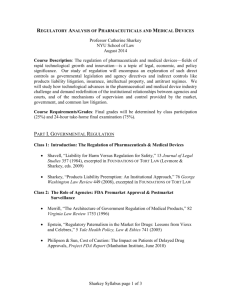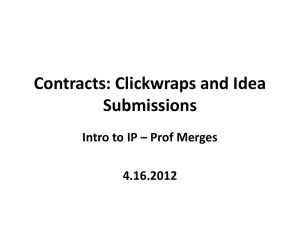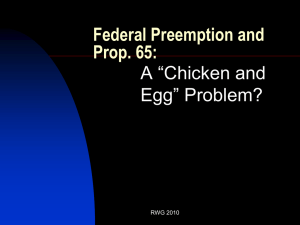stantonWIII
advertisement
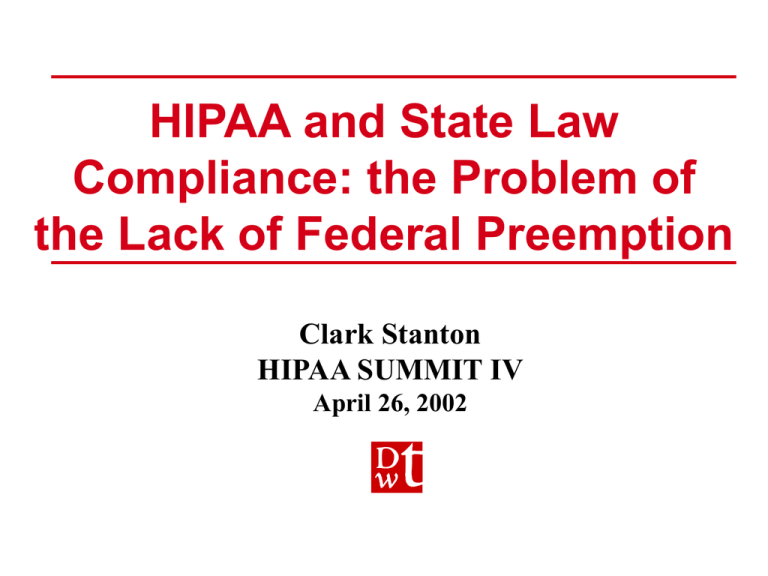
HIPAA and State Law Compliance: the Problem of the Lack of Federal Preemption Clark Stanton HIPAA SUMMIT IV April 26, 2002 Preemption – What’s it all about? Each day we routinely deal with issues that are controlled by a combination of federal laws, state laws and local laws. Federal laws set automobile standards such as seatbelt and other safety requirements State laws set speed limits and other highway laws, establish standards for licensing drivers Local ordinances set parking fines, etc. 2 Preemption – What’s it all about? But what about other situations in which the lines may not be so clear? Can Berkeley require air bags in all cars driven within the city limits? Can Michigan impose special noise restrictions on airplanes flying over the state? Can Congress enact medical privacy standards? And if so, what is the effect on state medical privacy laws? What are the rules? Who decides? 3 Preemption Preemption is the name we give to the theory under which the law at one level (federal, or even state) eliminates or controls the power of government at other levels (state and/or local) to regulate or pass laws in a particular area of activity. 4 How It Works U.S. Constitution provides for a federalist system of government Single federal system with defined powers (e.g., coin money, declare war, regulate interstate commerce). State governments have authority to govern and regulate in areas not reserved to the federal government (e.g., health and welfare of its citizens). 5 Predicate for Preemption Predicate for preemption: U.S. Constitution, Article VI, Clause 2 aka the “Supremacy Clause” The Constitution and laws of the United States are the “supreme law of the land.” Preemption question: When do laws passed by Congress override State laws? Congressional intent Congressional power 6 Total/Field Preemption Total or “Field” Preemption - Where Congress intends for federal law to occupy a certain area or field of activity, to the exclusion of state law. Under field preemption, federal law invalidates all state laws dealing with the regulated area, regardless of whether they actually conflict with federal law, and prevents states from passing new laws in that area. 7 Partial/Conflict Preemption Partial Preemption: Allows states to legislate and regulate in an area covered by federal law, but only to the extent permitted by federal law or that state law does not conflict with federal law. Conflict preemption occurs when compliance with both state and federal law is impossible, or when state law stands as an obstacle to the accomplishment and execution of the full purpose and objective of federal law 8 Express or Implied? Preemption can be express or implied. Express preemption: Congress expressly defines extent to which its laws preempt State law. Implied preemption: We get to figure out what Congress intended with respect to preemption. 9 Preemption Analysis The preemption question: When and to what extent do laws passed by Congress override State laws dealing with the same subject. Did Congress act within its scope of power? Ex: Commerce clause versus health & welfare If federal law is valid, did Congress expressly describe the intended scope of preemption? If preemption is partial, to what extent does State law conflict with or present an obstacle to the federal law? 10 11 Preemption: Examples Transportation Air (interstate commerce) travel; railways; interstate highways Immigration INS, and naturalization border regulation Privacy initiatives pre-dating HIPAA Fair Credit Reporting Act Privacy Act of 1974 Alcohol & drug abuse information 12 Preemption: Hot Topics Tobacco Can tobacco companies successfully lobby for state or federal laws preempting the ability of local governments to restrict tobacco use? Firearms Do state laws permit local governments to pass more restrictive gun laws? Medical Privacy To what degree does HIPAA permit state medical privacy law to continue in effect? 13 Why Do We Care? Currently, each state has a complex array of laws that affect the privacy of medical information. Medical record confidentiality laws Public health reporting laws Special topics: mental health; HIV; genetic information Litigation related laws: physician-patient privilege; notice for subpoenas State constitutional privacy 14 Why Do We Care? Each state law concerning medical confidentiality has been crafted to provide privacy protections considered important to the people of that state. California HIV confidentiality law prevents disclosure of HIV test results and even the identity of persons tested for HIV California consumer notice law requires person seeking to subpoena medical information to give notice to subject of records prior to serving subpoena on third party 15 HIPAA Preemption Express Conflict based Contrary More stringent Exceptions Quirks More stringent state law undercut by “back door” provisions that bring HIPAA back in 16 17 Clark Stanton Davis Wright Tremaine LLP www.ehealthlaw.com
